Interview: Erin Herle is Keeping it Real
A conversation with Cobrinha Black Belt and Mental Performance Coach, Erin Herle, on authenticity, jiu-jitsu culture, finding purpose, and more.
I first found Erin Herle back in 2019, ten years into her journey in jiu-jitsu and two years into my own. I was struggling with my own mental health, for which, in hindsight, jiu-jitsu was equal parts cure and cause. Jiu-jitsu was a way of getting in shape, but it was also a way of coping with the hellscape of the corporate world. The difficulty of the sport, the seeming meritocracy of the mats gave me a sense purpose as an adult, a way to reshape my childhood identity as an academically-inclined achiever.
In 2019, I’d gotten sucked into jiu-jitsu to the point that the only thing missing was “bjj” in my Instagram handle. In 2021, when I went on sabbatical to train jiu-jitsu full time for a year, my mental health worsened. If you think I’d learned my lesson after sabbatical, guess again: my worst performance was in 2023, when I cracked from the pressure of expectations for my own performance, along with an awful desire of wanting to make my coach proud. In 2025, my mental health is still a work in progress when it comes to jiu-jitsu, given the added narratives of injury and “return to sport.” I’ve written about this in pieces, but won’t be able to do this theme justice until I’ve “fully processed.”
When it comes to the themes of performance, mental health, achievement, and identity, few in the jiu-jitsu world can speak to these kinds of emotions and experiences better than Erin Herle. Many of the things I’ve wanted to say about my time in this sport, Herle has expressed better than I have.
She is unapologetically authentic, and I hope that’s what will come off the page for you in this interview, which touches on Herle’s story, her professional transitions through and out of full-time jiu-jitsu, and more.
Before we dig in, a quick bio of Erin Herle
Herle hails from Los Angeles, and her journey in the world of jiu-jitsu began in 2008, when a couch-surfing friend from out of town took her to watch the Pan American Championship in Dominguez Hills, California. In 2009, she tried her first class, and went all-in as a professional jiu-jitsu athlete for the next ~10 years, before transitioning into other combat sports (Dutch kickboxing and MMA), pursuing new professional interests (EMT and firefighter), and ultimately carving a career at the crossroads of her various experiences by earning her certification as a Certified Mental Performance Consultant (CMPC).
Herle certainly stands out for her jiu-jitsu pedigree, having gleaned her experience from a lineup of legendary athletes in the sport: she started her training under Romulo Barral, got her brown belt from the GOAT, Marcelo Garcia, but mostly came up under Featherweight hall-of-famer, Rubens Charles (Cobrinha), from whom she received her black belt in 2017.
More importantly, Herle stands out as an advocate, from starting Submit the Stigma, a jiu-jitsu mental health nonprofit she founded developed in the wake of her father’s suicide, to her current line of work as a mental performance coach, in which she helps athletes and professionals perform at their very best.
Without further ado, here’s the interview, edited for length and clarity.
On Authenticity and Authority: Herle’s Backstory and History of Self-Expression
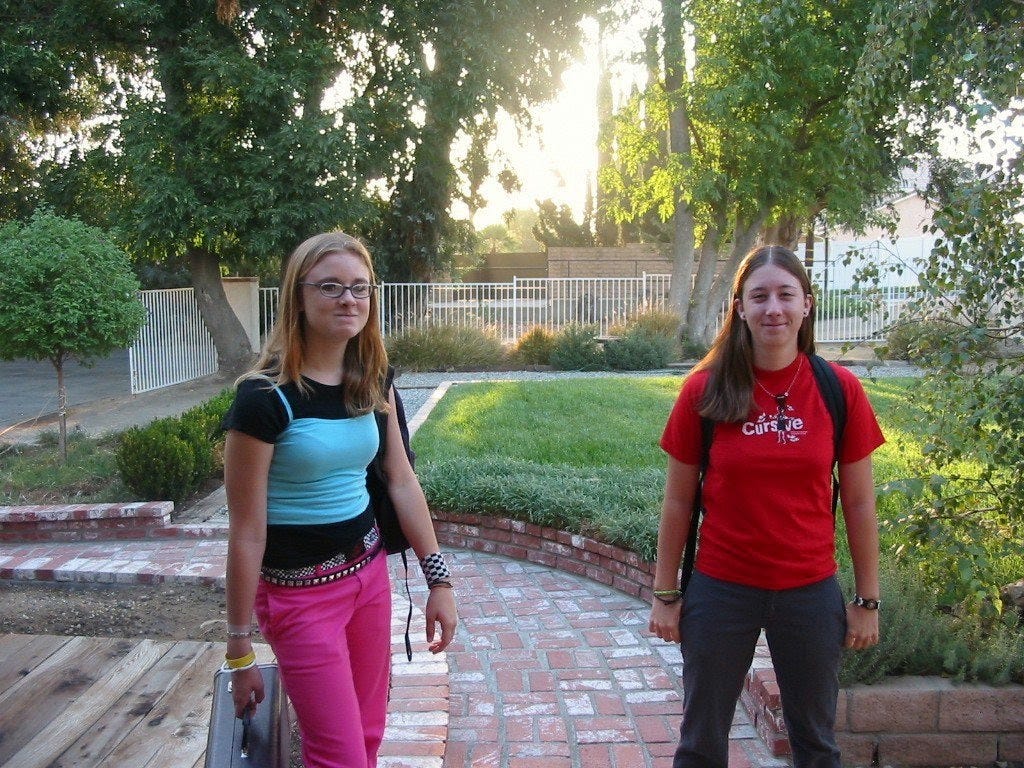
Erica: To kick things off, I wanted to mention a post you shared recently on social media about self-worth and competition. I found it emblematic of your style and reminded me why I recall following you in the first place back when I was a white belt. I’ve got a lot of questions for you on the theme of self-worth, but I want to start with the theme of self-expression.
My sense is you never really had a filter, but it’s one thing to not have a filter and another to not have a filter and put it all out there on the internet. Were you always this forthright, on and offline? Or is that something you cultivated later on in your life?
Erin: I’ve been writing my feelings and opinions on the internet since I had an Xanga in middle school. I later had a Livejournal, then Myspace, then a blog when I was a white belt until purple belt. I think I’ve always had this strong internal compass where I can discern between what is genuine or worthy of my time, even at a young age.
For example, school-wise, my parents would be like, 'The teacher doesn't matter. You just have to get good grades. You just have to do what they say.” But I feel like I always held authority accountable. If the teacher said they were going to do something and didn't, or I felt like I was putting in work and they weren't—and I was like 10 years old—I found it hard to respect them.” Leadership should be taken seriously and yes, I’ve been critical of authority my whole life, but I think it’s my justice sensitivity that is common with ADHD. If I feel myself or others are being treated unfairly, it’s hard to just go with it.
Having no filter has certainly gotten me into trouble but I believe the pro is my ability to be vulnerable and say things that others won’t. Sharing my experiences, no matter how small, has had more pros than cons so far, though.
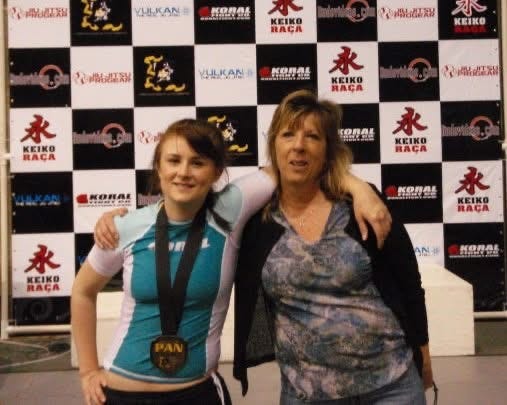
Erica: That’s interesting, because in jiu-jitsu, there’s this inherent authority of an instructor running a class and following someone’s orders in a classroom. Did jiu-jitsu offer a kind of authority you could entertain when you first started doing it? Or did it “check boxes” for you in some other way?
Erin: I found myself in jiu-jitsu, and that was when I was 19, probably because being able to be myself was really hard as a kid. Home life was rocky at times and my self-esteem wasn’t great. I did my best not to get in trouble in school because it would mean trouble at home. A lot of the time on my report cards, I got, “She talks too much. If only she would focus.” In high school, I was a little straight edge kid, going to concerts and stuff, but hanging out with a bunch of kids who had no ambitions. I tended to hang with all kinds of people rather than committing to one click. I think I wanted to avoid comparison so I was just the weird one.
On the mats, I found a place where I was like, “Cool, there's structure, but there's creativity. I’m flexible and I'm weird. All of a sudden, things are working for me that don't work for other people. I'm doing spider guard. I'm picking these things up really fast.
But I’ve also been told so many times like, “Oh, you don't want to do the hard work. You don't want to work hard.” It can look like that from the outside, I guess. Even though I'm keeping my head above water, I'm struggling a lot. I'm sacrificing a lot more than other people, but it doesn't look that way. I was late-diagnosed with ADHD, and a lot of females go late-diagnosed or never diagnosed, because the perception is, Well, she's doing fine. She's getting good grades. Oh, she's struggling, but she's getting good grades. She's struggling but she's winning. So we don't need to interfere.
That's why a lot of what I do now in my coaching practice is focus on wellbeing. I will be the first person to notice someone white-knuckling it and say, “Hey, you're injured. Maybe you shouldn't be training.” Or, “I know you want to win Worlds and stuff, but, big, long term, what's the purpose of driving yourself into the ground?” Now, if you can actually take care of yourself and do the stuff, that's going to give you more longevity, be more sustainable. What I'm big on now is that optimal well being creates optimal performance. If your basic psychological needs aren’t met, you're going to be more concerned with meeting those needs than you are with the goals you have in front of you.
Herle’s Entry into Jiu-Jitsu: A Case in Choosing to Do What You Want
Erica: Would you say that your point of view on wellbeing and meeting your needs is something that you established over time, or is there a moment in your backstory where those insights really hit you?
Erin: What's funny is it comes from the one guy who got me into Jiu Jitsu. In 2008, I was in an online forum for hardcore music called B9, short for Bridge Nine Records. It was a lot of shit talking, and I made some friends in the community. One was a guy named Kenny, who was into Jiu Jitsu. He was training in Baltimore, but coming out to California for a jiu-jitsu tournament, and I was like, “Do you want to hang out? You want to meet up?” And he was like, “Yeah.”
I picked him up, and I was like, What do you want to do?. I showed him all around LA, and I ended up going to the tournament, where he showed me everything. “Here are the brackets on the wall,” because back in the day, they would actually print them out. “Here’s how you find your name and the match time.” I watched a female match—a brown and a black belt together—and I was like, “Damn, this is cool!” Then it took me a year to actually walk into a gym.
I remember online in the forum, people were like, “Kenny, why do you do this? You just go and travel. You don't plan things, and you just sleep on people's couches. How do you do it all?” And he's like, “I just do more of what I want. You don't want to do this? Then don't do it. You want to do this? Then just do it. What's stopping you?” He made it so simple.
I thought that was so novel: how even if you're doing things you don't want to do, you could do it in a way that makes it more pleasant. I decided, “I'm going to start creating a life of things that I want to do, not because I feel compelled to do it, not because my mom wants me to do it, but because I want to do it.”
Erica: What did that pursuit “creating a life of things that I want to do” look like for you at that time in your life—being nineteen and beginning jiu-jitsu?
Erin: At that time, creating a life of things I wanted to do looked like separating from who I thought I was supposed to be. I was nineteen, in a full-time undergrad program, working Craigslist jobs just to afford training, wanting to be a World Champion, figuring things out by trial and error. I didn’t have a grand plan. It was more like following a gut feeling that I was finally in the right place, doing something that made sense to me. Jiu-jitsu was the first thing I decided on my own without my mom’s permission or funds.
Jiu-jitsu gave me a structure I could actually respect. It wasn’t just about following orders, it was about learning, experimenting, messing up, and trying again. It gave me an outlet for expression and a system that felt earned, not inherited or just given. For the first time, I wasn’t just performing for someone else’s approval. I was choosing to show up. It sounds trite but it felt like the realest endeavor I had ever taken on.
It wasn’t glorious. I didn’t have money, I didn’t have a roadmap, but I had drive and curiosity. That was the beginning of me realizing I didn’t have to live by default and I could build something that felt aligned, even if it looked messy or unconventional to other people. That’s when I started trusting myself more.
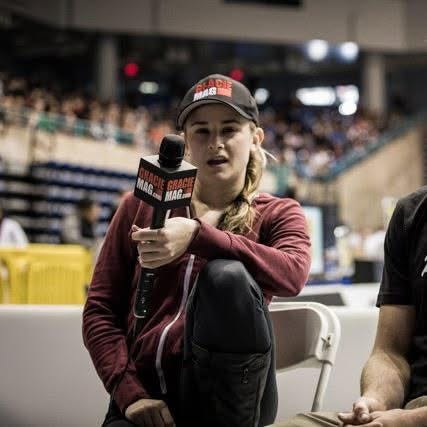
On Trying Things Out and the Importance of “Quitting"
Erica: You’ve been in and around this sport and community in so many ways over time, as a journalist, a photographer, a competitor, and now as a mental performance coach. What’s your best advice on fulfillment—in or outside the realm of combat sports?
Erin: Trying things out. In general, I think the experience of try it out is important. You don't know until you try it on, try it out, experience it, fuck around. I have a lot of shame in the sense of I try things and then I go, “That's not for me.” From the outside, it looks like I'm a quitter, but in reality, I’m thinking, “Why would you want to be in a room that wasn't for you? Why would you want to commit to something that, even if it's cool, it’s socially acceptable, people are going to think more highly of you, or whatever, if you have to mask every time that you're in that room?”
It's not worth it, and it erodes your own self trust. When you stop listening to what you truly want and you start asking people to tell you what you should want, that’s a path of inauthenticity. I'm like, “If I have to grit my teeth to get through it, it's probably not for me.”
And so try it on. Figure it out. It doesn't work? Move on. There's always going to be something else.
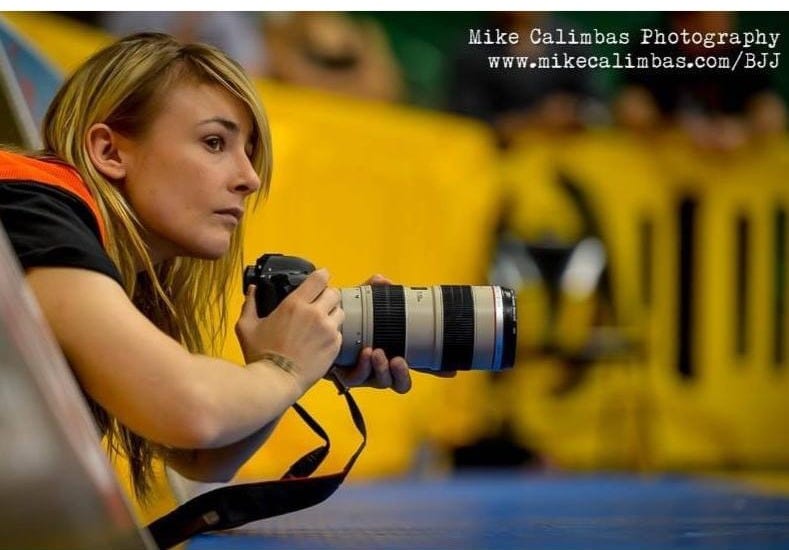
Erica: You said something like, “From the outside looking in, it looks like you try a lot of things and you're a ‘quitter.’” What are some of those things you’ve quit—what does that “quit list” even look like?
Erin: I tried out for cheerleading in high school, but I was already a junior, and I couldn't dance the choreography. I had the tumbling because I'm flexible but they already had too many seniors on the junior varsity team.I grew up riding horses before that and even did a 30-mile endurance ride in Malibu on my horse Booger when I was 12.
In college, I started in Psych—weird teachers ruined it for me—and then I went to sociology/criminology but I realized everybody wanted to be cops and I was like, “That's not how I want to spend my days,” and I switched to English. I tried dropping out of college a lot. It took me seven years to get an undergrad. Every time I wanted to quit my mom would be there to talk me out of it. She’s my favorite support system.
Career-wise, I tried EMT when I was 20. I completed the course butdidn't take the test for certifification. But ten years later, in 2020, I took the exact same program and I became certified because I wanted to be a firefighter. I went in, head first, on that, and got to the interview stage in a bunch of different departments all over the US.But once I got to the physical I was having difficulties with the weighted vest and couldn’t get myself in the shape I needed. I decided not to pursue it further after realizing how much my life would change once I was working for a department full-time.
When I found out about the role of a Certified Mental Performance Consultant, I applied for an online master’s degree program for sport and performance psychology. The degree was non-clinical—I didn’t want to be a psychologist or a licensed mental health professional. The CMPC role is for performance-related stressors and demands and should more serious mental health issues arise my job is to refer out. There's so much freedom I have to reinvent myself within this non-clinical area. My life experiences have all kind of come together in the performance coaching, but definitely the quitting part is hard. People just think, “Oh, you're giving up,” or, “Oh, it got hard and then you didn't want to,” but it’s more like, “No, there was a turning point where it was not worth it anymore.”
Jiu-jitsu-wise, I did photography for a while for Gracie Mag and really pursued journalism for a while and loved it, until I eventually decided, “It’s not my thing.” I worked as a writer for jiu-jitsu websites, doing product descriptions, interviews, and newsletters for various BJJ brands, before FloGrappling was even a thing. I competed at nearly all the events I covered, too.
The transition out of that was a huge thing, because at the time, I was like, “Oh, my God, jiu-jitsu is everything. All of my success is going to be in jiu-jitsu.”
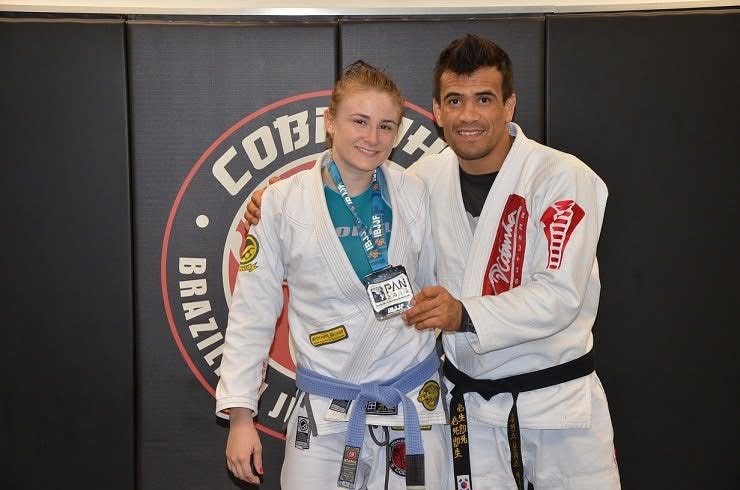
Herle’s Identity as a Jiu-Jitsu Competitor—and its Consequences for her Self-Worth
Erica: You alluded to this and we’ve been leading up to this: tell me about your experience in and transition out of full-time competition.
Erin: My relationship with competition used to be a test and “the fun part” since I was so dedicated to training hard. But it ended up feeling like it all was worthless unless I was winning.
I was a white belt thinking about being a black belt world champion. I started competing within three months of starting jiu-jitsu, thinking,“This is a rush. I've never experienced this before.” I picked up things fast, and I loved when people from the crowd would ask me how long I had been training. Because it was a flex, right? I was six months, eight months in and I was already submitting people in competition. I couldn't tell you why, but jiu-jitsu just clicked for me. But then I started getting expectations.
At white belt, most of my training partners were getting their blue belts and when I asked Romulo about getting mine, he said “If you win the Las Vegas Open, I'll give it to you on the podium.” There was no one in my division, so I had to go up a weight, but I made it happen. I had two matches, I got my blue but on the podium, and I was like, “This is sick.” It was nice to have validation and recognition for my efforts.
The following year, I moved to Cobrinha’s gym—Romulo’s gym had no women and I needed to work with female training partners. At blue belt, at the following year’s Las Vegas Open, one of my new teammates and I both won our divisions and closed out open weight. Gracie Magazine chose to write a blurb about my teammate and I. So then my motivation became, “I want to be cool. I want to be written about.” It sounds dumb but again, this was the first time I was noticed and given attention for my achievements. It was building my self-worth.
Once people start expecting you to win, though, that's the hard part. People were like, “Oh, Erin’s entering this division, she can win, she needs to win.” And then if I didn't win or didn’t make the podium, then it was like I wasn't there.
This went on for a considerable amount of time: At blue belt I decided to commit to training full-time after being laid off from a temp job. I was given the opportunity to work at the gym and I went full send. The results showed. I closed out my division with my teammates and got second at Worlds at I got my purple belt, graduated from college, and moved to be with a boyfriend in New York/New Jersey and train at Marcelo Garcia’s gym. I was almost 25, and I had made jiu-jitsu my life. A lot of my worth came from if I could win or make the podium.
I hate this part about my time as a competitor. When I was a blue and purple belt, I was such a snob that if I entered a major tournament and saw a name I didn't recognize, I called them a 'bracket filler.' I honestly thought they didn't deserve to be there because I was sacrificing so much and struggling. I don’t why, but being elitist somehow protected me from feeling shame for my life choices. When you marry struggle and sacrifice, you end up competing for the sake of making that worth it.
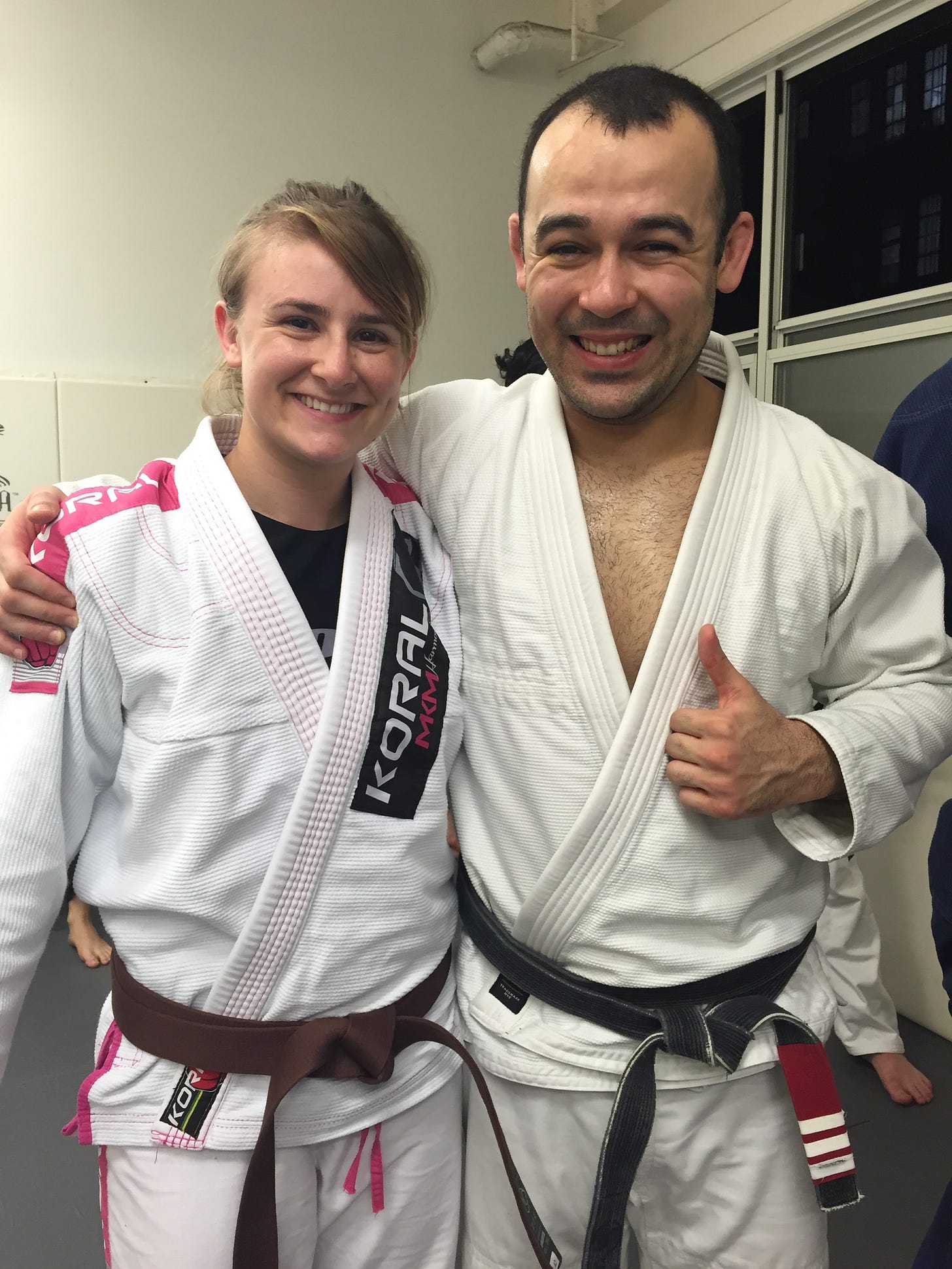
The Breaking Point: How Herle Began Decoupling Worth from Competitive Outcomes
Erica: When did that sense of self-worth tied to competition start to break for you?
Erin: It all came apart with a medical issue when I hit Black Belt. I went to Europeans in 2018, and I felt, “Hey, there's something weird going on, where it's like a dull ache in my left side. I thought it was a kidney stone. The night before I competed, I went to the hospital for an ultrasound. I waited forever and finally when I got the procedure the technician asked me to drink more water for a better read and I said, “I’m sorry. I can't do that. I'm cutting weight after this.” The doctors said, “We think you have something going on there, but we don't really know.” I kind of just ignored it after that.
I went to the sauna, did what I needed to do and went to the competition the next day like normal. I won my first match, got to the finals against Bia Mesquita the next day and fought, but every time my heart rate would go up, I would feel this achy pulsing. The match was less than pleasant and she defeated me handedly. I remember putting myself in the shoes of those in the crowd and wondering how “this chick” even made it into the finals with a showing like that.
I didn’t go home right away after that. I did a seminar in Florida and another competition. I finally went home, and found out I had a cyst the size of an apple on my ovary called a dermoid cyst or a teratoma tumor. It had a jaw, teeth, and hair. I always get the weird stuff. Man, always.
So that was the experience that took me out of my athletic identity, because you start to think, “When you're not able to do the thing, then who are you?”
I could train but it wasn’t advised, and I did a Fight2Win against the doctor’s orders–“I don't think you should do that. If your ovary ends up turning, it's going to get stuck that way, and it's going to be the most excruciating pain of your life, and you might end up losing your ovary.” I did the match and then lost. Ha.
I finally got the surgery to remove the cyst in March, two months after finding it. Since I had already earned the ticket to compete at the Abu Dhabi World Professional Jiu Jitsu Championship (WPJJC), so I said, “ Screw it. I'm going to take what the full travel package I earned andand go see my friends.” When I was there, I decided to compete after all. I actually took the last stitch out of my belly button the morning of my matches. I lost my first match and won one in the repechage. But there wasn’t pain and I could fully return to competition.
I was like, “You know what? I’m not in any pain. I have one month to get ready for Worlds, my first Black Belt Worlds.” In hindsight I don’t know if I should have competed but I felt it was important to live out this dream I had for eight years and wanted to get right back into it. I felt I didn’t have a lot of support from my team because I hadn’t been around much. I also felt a disconnect with my coach. I wasn’t able to make my usual weight class and had to go up, which felt like failure. I struggled to feel ready.
It wasn’t until the day of my competition, standing there matside, that I knew I wasn’t in it. I didn’t want to be there. I remember feeling like, “wow, I’m here at this pivotal point of my career where I’m able to realize the black belt world champion title. Then I realized how I had only been a black belt for about 6 months, wasn’t able to train for a bit of it, didn’t have the right preparation or support, and I was up against multiple-time world champions. It didn’t feel right. I lost in like two minutes to a triangle armbar and from then on I went seeking for something outside of my own training routine.
But leading up to this point, there were times when I’d cry over my food, thinking I didn't deserve it because I lost my first match. There was a lot of pressure to perform well to prove myself and make all of my sacrifice worth it. When people would say, “Hey, don't be so outcome-focused, enjoy the process,” I’d look at my process and go, “I don't enjoy my process.”
People who are very competitive are going to think, “I need to win tournaments and I'll do whatever it takes.” I tried that. It's very lonely, and being lonely made the process not very fun.
On Finding Her Purpose and How to Change the Culture of Jiu-Jitsu for the Better
Erica: How did you reframe your of self-worth outside of jiu-jitsu, especially after having the sport so entrenched in such a significant period of your life?
Erin: I started to believe that true worth came from me helping other people. I spent a lot of my 20s wanting to be important, wanting more followers, more likes, to be seen and heard.But it was shallow.
I went into MMA and kickboxing because I wanted to be outside the culture of competitive jiu jitsu. It was fun for a while but I still ran into some toxic coaching and bad experiences there. No culture is perfect, of course. But it was the pandemic that gave me time to step away from all of it. Of course I panicked and tried to be a firefighter because I wanted to be deemed “essential” but realizing that I had much more to give than just competition results and techniques was huge. Going through the master’s program was key because they allowed me to write my papers and do research through a combat sports lens. It helped me see my lived experiences through evidence-based theories and frameworks. With plenty of room for much-needed research on the mental training within these sports.
Being away from the culture was good because I had grown tired of hearing about the latest sexual assault allegations and watching major organizations sweep it under the rug. The hierarchy aspect of jiu jitsu gives clear structure and guidance for progression but can be used to exploit people. I learned a lot about ethics and ethical leadership and it was eye-opening to realize that this sport I love suffers from a lack of regulation, accountability, and psychological safety. Other sports have reporting structures and regulation and supportive networks but ours is limited. Even in MMA, athletes are not treated as employees and aren’t given as much support as they should for much they dedicate to their sport. It’s hard not to dwell on these aspects when my job as a mental performance consultant is to help people cope with the stressors and transitions of their sport when its the culture and environment that causes a lot of the issues. How do you tell a white belt to advocate for themselves in a class run by a black belt? The hierarchy can cause harm sometimes.
Erica: And that same kind of attitude in jiu-jitsu—of strictly worshiping and valuing people by rank or performance has some bad consequences, too.
Erin: For sure. I was spoiled living in LA because I walked into a gym that had a multi-time black belt world champion teaching. It was happenstance. But it exposed me to the highest level from the very start. I didn’t idolize people in jiu jitsu but I understood how much respect was given to these superstars of our sport. Walking around a tournament with Romulo and people are asking for pictures left and right. One time we were at a chipotle in 2010 and some dad in line recognized him. It was cool to see how champions were revered in this sport. And of course I wanted that, too.
But it’s important to also zoom out. I made jiu-jitsu my life. I didn’t even have friends outside of jiu jitsu anymore. I was traveling all the time for tournaments, going to seminars, cross-training, writing and distributing a zine, even. I was so absorbed, I only looked to people within the sport for advice. I only dated guys within the scene. I only followed BJJ accounts, all that. You get to know people pretty well and there are some unsavory people who are revered no matter how shitty they are as human beings. That doesn’t sit right with me.
Power dynamics in our sport are huge given how much respect we give black belts. If you’re in a hyper-traditional school, hierarchy can lead to thinking you’re awful at jiu-jitsu if you get passed by a lower belt. Or giving all the credit to a higher belt if you get the better of them since they were “just going easy”. We give up autonomy if we can’t say no to a higher belt. I mean, it takes no education of teaching or ethics or leadership to open a BJJ school. When we see black belts as “holier than thou” or all-knowing or wicked cool, we tend to put them on a pedestal. And when we do that, we lose autonomy and intrinsic motivation.
I read an article about how they interviewed women on Canadian team sports once they retired, and they did not realize the abusive coaching that they endured until they were outside of it. Most people do not recognize how societal norms and cultural norms are exploiting them until they're outside of it. That’s another aspect that I want to champion for athletes, but it doesn't make a lot of waves.
Erica: Is it salvageable? What do you think moves jiu-jitsu forward from a cultural perspective?
Erin: I look at the jiu-jitsu community as needing more support. The talking point used to be “female equality.” Now it’s, “Get women paid equally.” That's good for the competitors, but it’s not enough as a whole. What about the fact that these guys that people are looking up to have no coaching experience, aren’t values-based at all? They don't understand leadership. They're giving marriage advice. There’s an ability to hide behind your training lineage, acting as if passing down knowledge includes being a life coach. Some people are more susceptible to abuse of authority like myself. Lack of direction or internal compass can do that to you.
I lived my life as a professional athlete, but I had no professional support. There's no governing body. We're not part of the International Olympic Committee. There's no real regulation, no way to report abuse."
Look, I don't want to be the person doing a witch hunt in jiu-jitsu, or be someone who’s only going to talk about bullshit and awful things. That's why I chose what I do now, which is athlete advocacy.
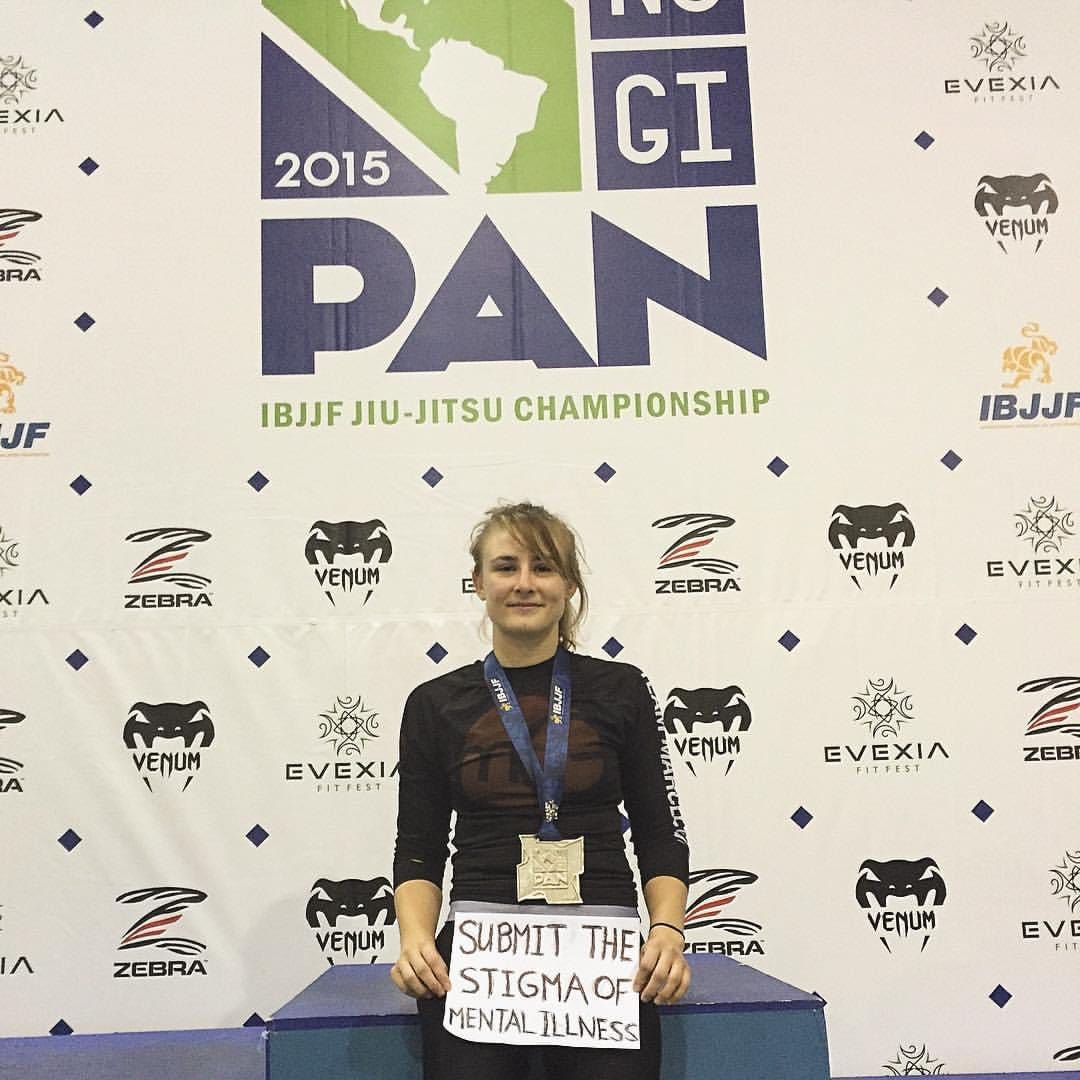
Erin’s Coaching Philosophy and How She Practices Athlete Advocacy
Erica: What does athlete support and athlete advocacy look like in your coaching practice?
Erin: Right now I mostly have clients focused on jiu-jitsu competition, but I also do people who just want to enjoy the sport again, like they just want to have their values and live by them on the mats. So I have people from eight years old to sixty-two, and it’s such a wide spread of people I can help, whether they even compete or now.. In the future, I hope to work with more high performance professionals, but most of my clients are jiu-jitsu clients.
I'm working with a white belt, but she's been training for a while. She's so coachable. She's 17, and her coach said after class last week something like, “You're coming up to the adult class, you're doing great,” and gave all of the students a stripe, except for my client. Stripes are whatever. I didn't get stripes when I was coming up. So who cares? But she cried, not because she wanted the stripe, but because she was socially excluded. It’s these little things that make you wonder, “What is my worth?”
It’s not always socially acceptable to go to your coach and say, “Hey, I know I'm nearing my next belt. What do you want to see from me? Or just how am I doing? What could I be working on?” And if they don't have that answer, they hide behind, “Don't ask me about promotions.” And it's like, “But you're my coach. You are in charge of my development,” and if I decided that, “Since you weren't giving me enough, I'm going to go self study,” they get mad about that too.
I say this to people: Let’s say you're working on a difficult move, and your coach comes over. Is your reaction, “Oh, thank God you're here. I have so many questions, can you please help me? Can you please check that I'm doing it right,” or is it “Shit. I gotta do it, and if I don't do it, well, then I'll just lie and tell him it was my bad side.”
Is your coach constantly evaluating you? That perception of being perceived, to be judged constantly and compared is hard on the psyche.
Some of my clients at one of the top gyms have managed to stay authentic. Even though the coach says, “You need to do this class,” they don't do it because they know their own limits. Good for them, because half the time when people do that, they'll never be taught again by the coach. As soon as a coach extends a hand and you don't do exactly what they want, it can be like, “Fine, I'm not going to help you then.”
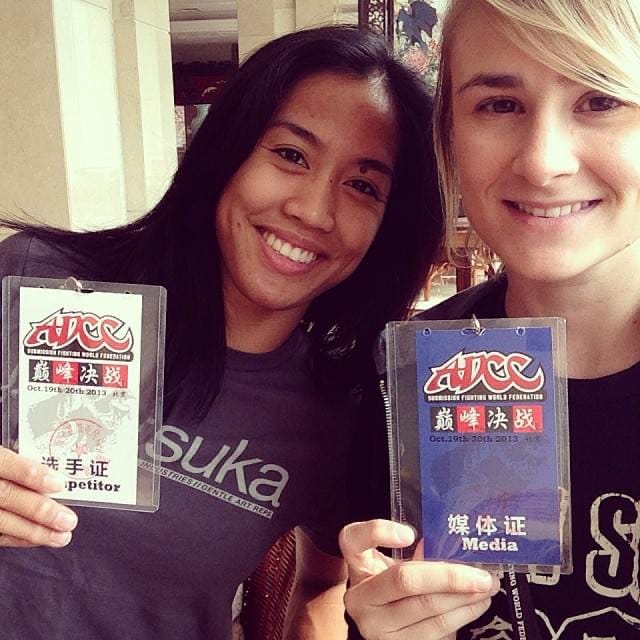
Herle’s Closing Thoughts on Leadership, Connection, and Identity
Erica: How do you see your role in the sport and your relationship with other people as a black belt and performance coach?
Erin: When I got my black belt and would go to my friend's gym, people would greet me with, “Hello, Professor,” almost bending over. But I wouldn’t even be in my gi or on the mats. I don’t have my own school or my own students so I don’t consider myself a professor. Yes, it’s a traditional term but not everyone deserves that respect just because they’ve earned a black belt.
I want to be a peer with people. I want to see people eye to eye. I don't like when people put me on a pedestal. I wanted that for awhile because it stroked my ego. But nowadays I don’t even want the spotlight. I find my worth in the ways I do my job and support the ones around me. That feels much better.
I don't put all my eggs in one basket anymore. I don't lose myself in anything anymore. That's probably the greatest thing I've learned—that I am multi-dimensional. Identity and having things change feels like death sometimes, but as Nayyirah Waheed says, “I don't pay attention to the world ending. It has ended for me many times and began again in the morning."
Want to stay in touch with Erin Herle?
If you want to follow Erin Herle, here’s a link to her Instagram, the personal one and the one for her coaching practice
If you want to buy Erin’s book, If You’re Not Laughing, You’re Losing: The Athlete’s Guide to Using Humor as a High-Performance Mindset Tool, you can check it out on Amazon.
If you want to work with Erin, you can check out her website and learn more about her coaching services.
You made it to the end! Thanks for reading!
If you’re a longtime subscriber, thanks for being here.
If you’re new to this Substack and enjoyed this conversation with Erin Herle, please share this post or drop a comment. I’d love to know what you thought about the piece.
For more interviews like this one, consider subscribing for free at the link below.

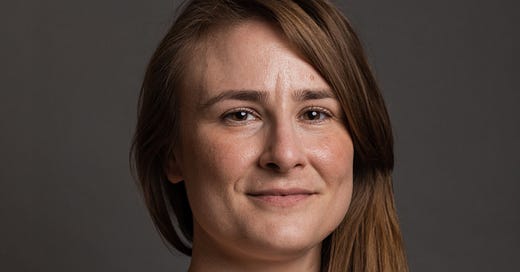


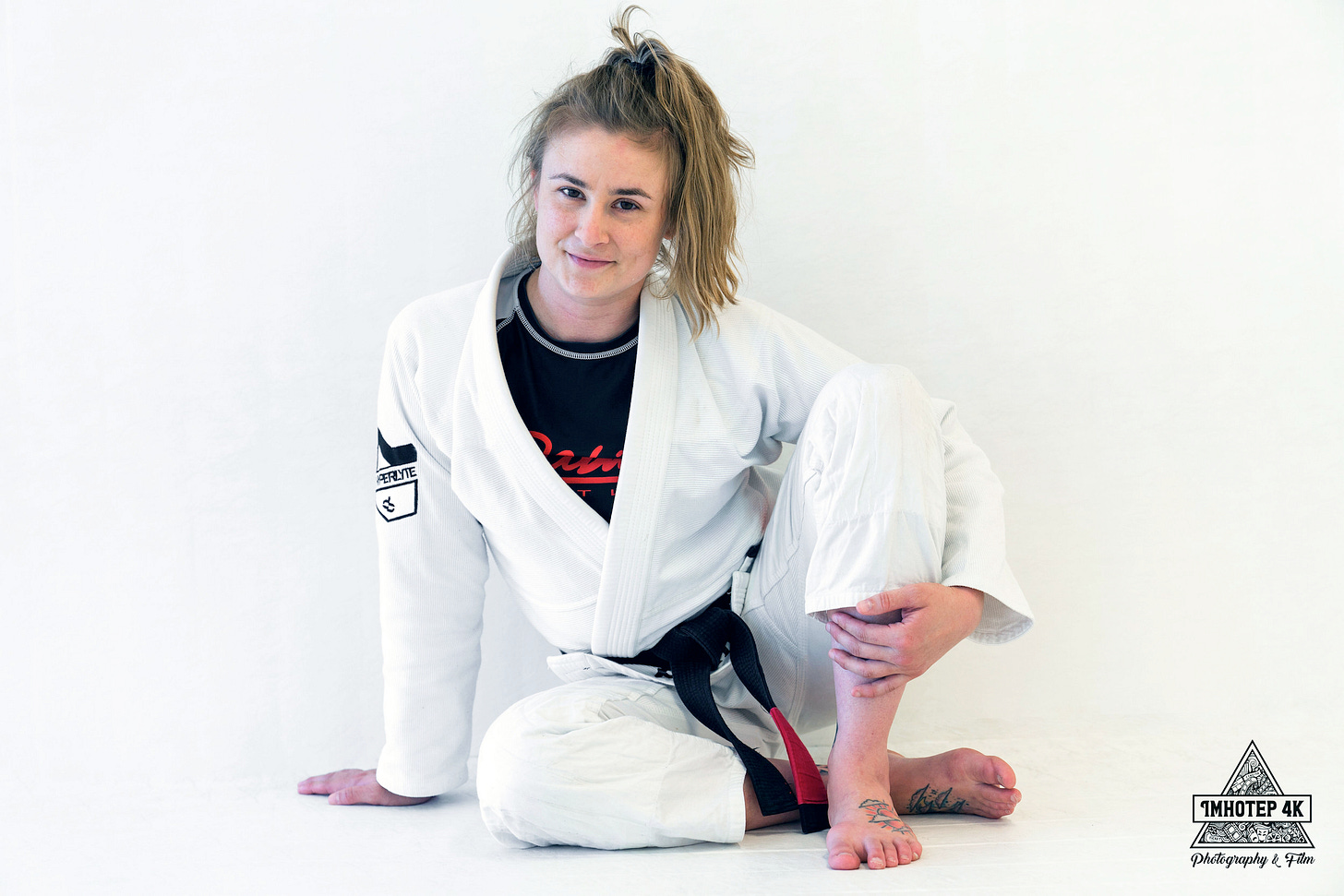
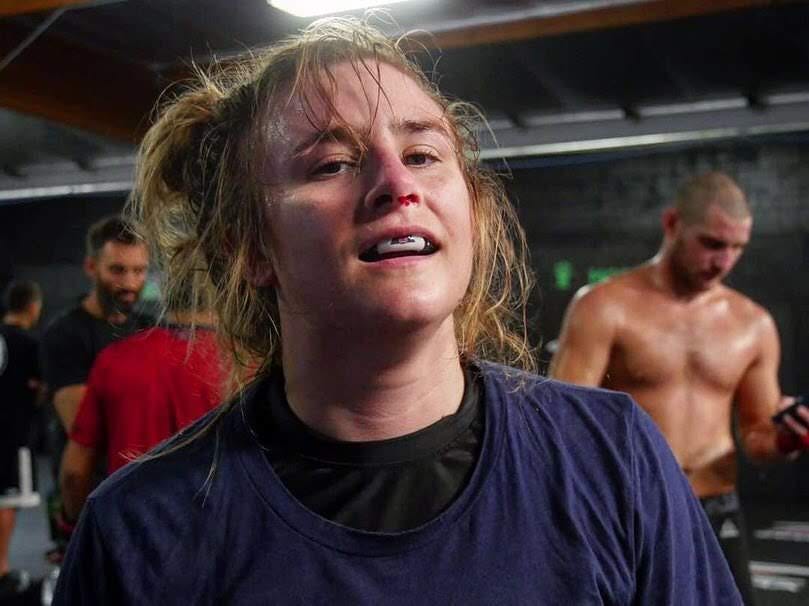
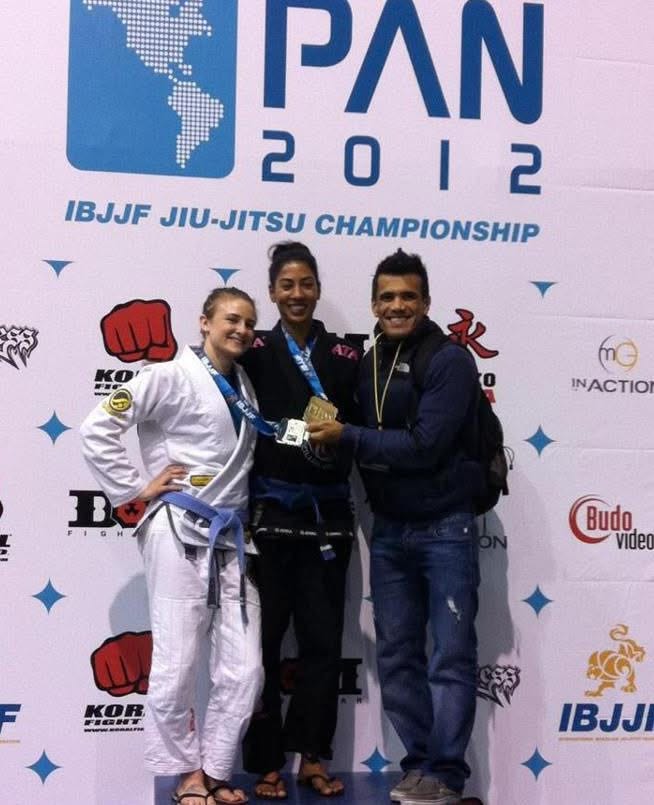
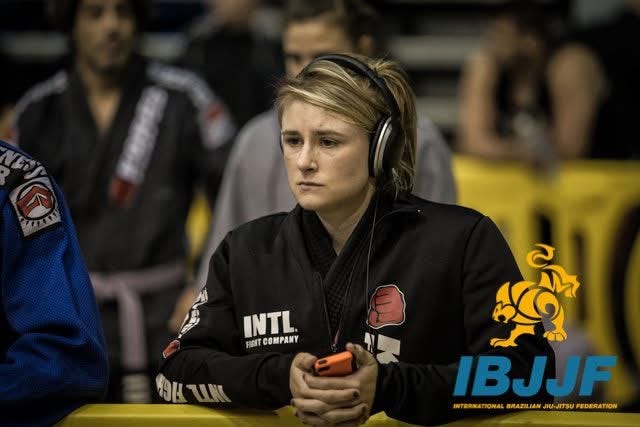
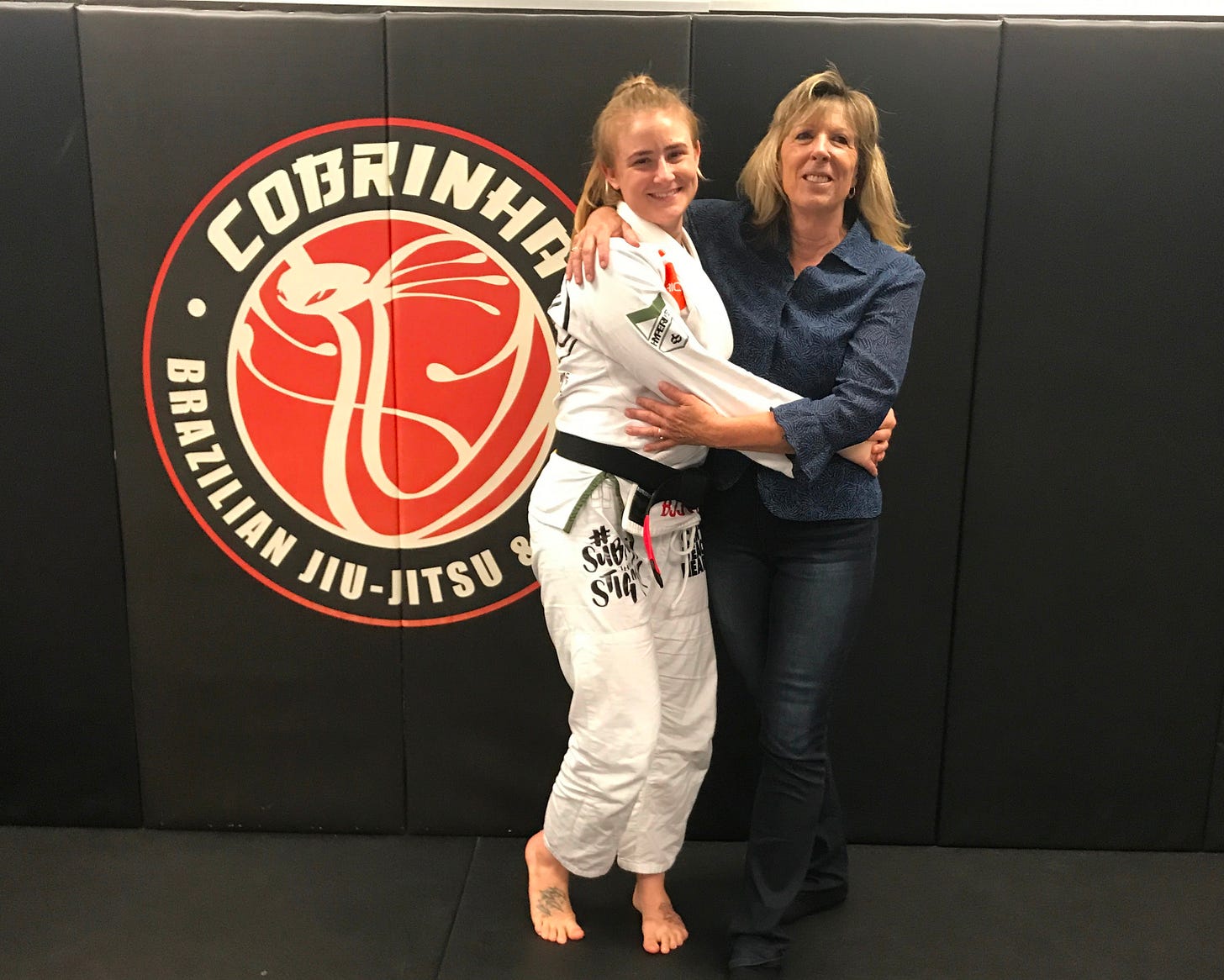

Hell yeah Erica. Your interviews, both the people you select and the conversations you draw out of them, are phenomenal